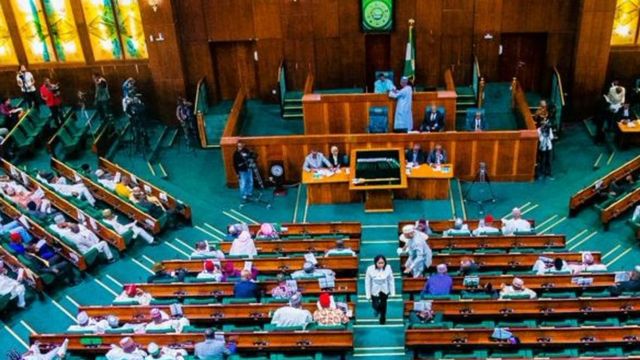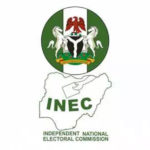Facts emerged on Friday that the minority caucus of the House of Representatives will soon challenge the controversial resolution passed on Section 52(2) on the electronic transmission of election results in a competent court.
Misunderstanding started again when the Deputy Speaker, Hon. Ahmed Wase who presided over the Committee of the Whole, accused the Deputy Minority Leader, Hon. Toby Okechukwu of “trying to mislead the House.”
In his intervention, Hon. Okechuckwu observed that the House did not reach a compromise on the electronic transmission of election results the stormy session, during which a motion for the division was proposed by a member.
However in his response, Hon. Wase argued that there was no motion to divide the House, thereby alleging that the Deputy Minority Leader, was trying to mislead the House and you are a Leader. I don’t want to repeat that again, Hon. Wase warned.
The Deputy Speaker called Hon. Boma Goodhead to order, saying: “We have our Rules.”
Despite all entreaties to calm down the protesting members, one of the lawmakers was overhead telling the Presiding officer “You are mad”, a statement which the Majority Leader, Hon. Alhassan Ado Doguwa retorted and asked: “You called somebody a mad man?”
Another member was heard asking an aggrieved lawmakers, saying: “You go kill am, E don do, when everybody say it’s okay, it’s okay.”
Yet unsatisfied with the manner in which the proceeding was conducted, Hon. Goodhead who was seen moving towards the Majority Leaders seat where the Speaker sat, said: “You sat there when we can conduct this electronically.”
After few minutes of hullabaloo, the aggrieved members eventually calmed down thereby paving way for the continuation of the sitting.
Members of the opposition parties led by the Minority leader, Hon. Ndudi Elumelu unanimously staged a walk-out from the Chambers, few minutes after the Deputy Speaker, Hon. Ahmed Wase shunned all entreaties to revisit the controversial provision on electronic transmission of election results which led to the protracted protest during Thursday plenary, and his insistence that the Section has been carried by the House at the Committee of the Whole.
The lawmakers who spoke during a press briefing faulted the presentation made by the Independent National Electoral Commission (INEC), through the Executive Commissioner for Technical Services, Engr. Ubale Pascal who disclosed that only 50.3% of the network coverage in 2018 ahead of the 2019 general elections.
Hon. Okechukwu who queried why NCC failed to ensure coverage of the 8,000 poling units left in the 2018 analysis conducted, argued that each of the frequencies mentioned by the NCC official namely “2G, 3G and LTE has the capacity to transfer data, it is very clear. So what we are having is rule of men, not our Rules.”
While responding to questions posed by some of the members, namely: Chairman, House Committee on Communications, Hon. Akeem Adeyemi, the INEC Executive Director explained that: “the Commission has the nationwide data analysis, on state by state and based on services whether it is 2G, 3G 4G otherwise referred to as LTE.”
Pascal said: “We did in 2018 on network coverage study in respect of all polling units in the country. We found out that we had about 119,000 polling units, we were able to get coverage of 109,000 and we plotted this across the map of the country and we super-impose on it the network coverage. We had service wide and we plotted 2G coverage, 3G coverage and LTE coverage and we were able to see that about half of polling units were covered with 2G/3G services; roughly about 50.3% and about 47.7% have no coverage at all.”
Some of the lawmakers who contested his submission, namely: Hon. Mark Gbillah and Hon. Stanley Olajide argued that the electronic transmission of election results does not require internet service and can be done successfully by 2G and 3G in any part of the country.
Hon. Gbillah said: “As a professional in the industry, first and foremost when you talk about 3G and 2G and LTE which he mentioned, these are technologies that have to do with internet or broadband. Now transmission of election result does not have to be by broadband and I am surprised that someone who suppose to be professional in the NCC does not know the difference.
“This USSD uses GSM network, that is all that we need, like the SMS message that is all that we required to transmit the results. We don’t need internet services. And we have more than 90% coverage of that,” he argued.
On his part, Hon. Udem Ehinem asked NCC whether it is possible to create a platform for offline result pending when collation officer could uphold when there’s network.
Alao speaking, Hon. Kingsley Chinda asked whether NigComSat is still functional satellite and whether there’s any oart of the country that the satellite cannot cover.
“He also asked about the type of communication network that can be used.
“How long will it take you to fix any emerging problem?
As captured in the Draft of a National Broadband Plan (NBP) for Nigeria (2020-2025), “As at December 2019, the market served over 184 Million Mobile lines, with 126 Million of those lines connected to Internet services. According to the NCC, telecommunication services in the country have grown from a tele-density of lower than 1% on fixed wireline and wireless networks before the DML auctions, to reach approximately 89% population coverage for voice services in 2019 primarily based on 2G/2G+ networks.
“Internet services in the country are currently provided on 2G, 3G, and increasingly 4G mobile networks. However, though 4G coverage is available to 37% of the population, download speeds in the country are noted to be generally uncompetitive with other countries in the same income bracket. In recognition of the tremendous economic growth opportunities afforded by the deployment of broadband technologies, Nigeria established its first broadband plan in 2013 for a period of five years.
“The plan set out to achieve broadband access, defined as minimum download speeds of 1.5Mbps with at least 30% coverage, and an objective of achieving 3G coverage to at least 80% of the population. Given the current state of technology, development and applications of broadband technology, the 30% penetration achievement lags the aspiration of the country as the developed world marches towards widespread deployment of 5G technologies, while the country is yet to achieve significant 4G coverage and adoption,” the document sighted by Tribune Online stated.
YOU SHOULD NOT MISS THESE HEADLINES FROM NIGERIAN TRIBUNE
We Have Not Had Water Supply In Months ― Abeokuta Residents
In spite of the huge investment in the water sector by the government and international organisations, water scarcity has grown to become a perennial nightmare for residents of Abeokuta, the Ogun State capital. This report x-rays the lives and experiences of residents in getting clean, potable and affordable water amidst the surge of COVID-19 cases in the state…
Selfies, video calls and Chinese documentaries: The things you’ll meet onboard Lagos-Ibadan train
The Lagos-Ibadan railway was inaugurated recently for a full paid operation by the Nigerian Railway Corporation after about a year of free test-run. Our reporter joined the train to and fro Lagos from Ibadan and tells his experience in this report…
WATCH TOP VIDEOS FROM NIGERIAN TRIBUNE TV
- Let’s Talk About SELF-AWARENESS
- Is Your Confidence Mistaken for Pride? Let’s talk about it
- Is Etiquette About Perfection…Or Just Not Being Rude?
- Top Psychologist Reveal 3 Signs You’re Struggling With Imposter Syndrome
- Do You Pick Up Work-Related Calls at Midnight or Never? Let’s Talk About Boundaries







